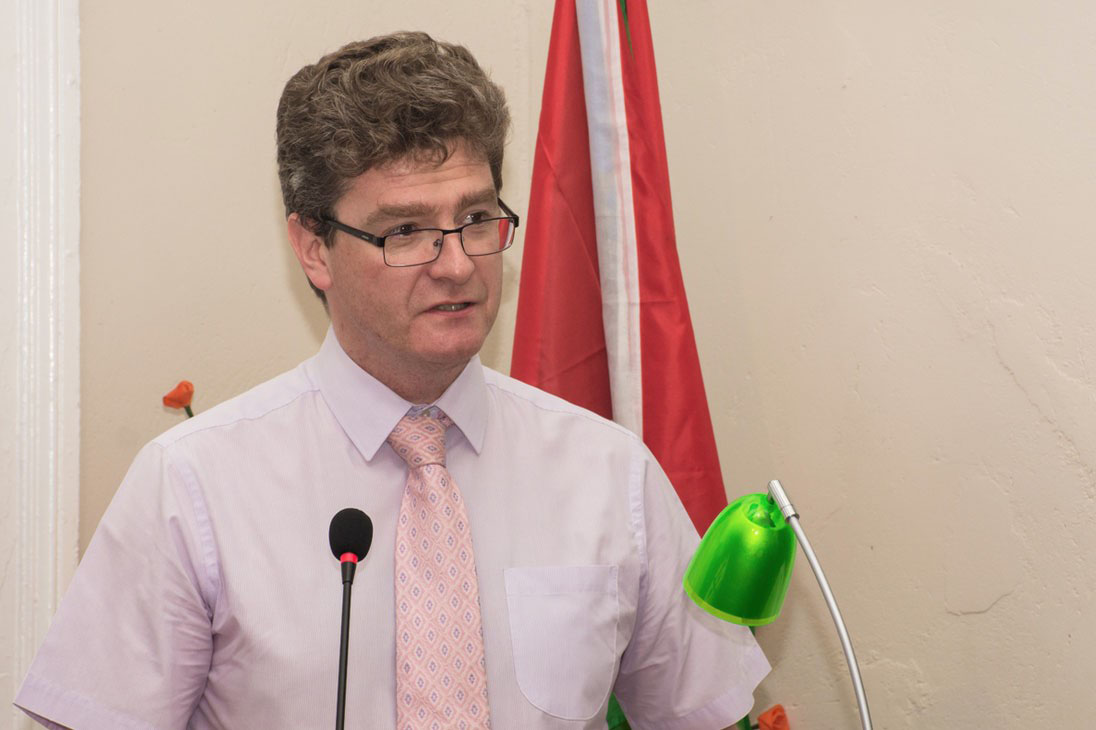-former UK envoy
Former UK High Commissioner to Guyana, Greg Quinn says that the only way to halt the carnage on this country’s roads is to increase the size and number of punitive fines and punishments being handed out to drivers breaking the law.
These fines, he suggested, should increase in dollar value, and their collection more actively pursued, to end the plague of delinquent payers. In addition, drivers should get points for transgressions (and lose their licences if they accrue too many), and vehicles should be seized in the most serious cases (such as drink driving or driving under the influence of drugs).
In an Op-Ed in yesterday’s Stabroek News, he pointed out that the police must diligently and fairly ensure the rules are enforced and properly recorded, and everything needs to be above board.
He posited that only through such punitive actions will behaviour change and used the UK as an example of punishments being used effectively to bring about needed changes in driving culture to the point where drivers there now police themselves for the benefit of all. This is especially true when it comes to the issue of drinking and driving and added that sadly, this is yet to be case here in Guyana.
Quinn stated that any frequent user of Guyana’s roads cannot help but observe the daily disregard for basic road rules and civility displayed by drivers of all ages including foreign nationals as well. Describing some of the unsavoury acts, the former High Commissioner noted that drivers routinely cut others up, barge in at junctions, fail to obey roundabout rules, create their own lanes, cuss each other out for the simplest of transgressions, and are basically abusive and rude to each other.
And to add to this dilemma, it is Quinn’s view that the Guyana Police Force seems incapable of doing anything about it and when it does try, it lacks the support it needs to punish those who break the law, “often because the transgressors seem to have some ‘connections.’”
He acknowledged that while there has always been a small segment of drivers (‘Pitbull’ drivers included), it would seem that everyone now seems to think they are. And despite the new traffic infrastructure, getting anywhere (especially at rush hour) seems to take ever increasing amounts of time. Quinn attributes this to the huge and ever-increasing number of vehicles now on the road which he opines, adds to drivers’ impatience and frustration, and ultimately to their bad behaviour.
Taking a look at the statistics, Quinn noted that fatal accidents and deaths look on track in 2024 to roughly mirror those in 2023 – about 136 fatal accidents and 158 deaths.
And as far as Quinn is concerned, these are “shocking” figures as they equate to about 17 fatal accidents per 100,000 people and 19 deaths per 100,000 people. He compared these figures with fatalities in the United Kingdom which worked out to be 2.4 per 100,000 people even though the distances driven over there are significantly greater compared to Guyanese drivers.
The former diplomat also touched on the boorishness of local drivers, asking what many observers have also voiced, “When did Guyanese drivers become so uncivil? He added, “Yes there have always been frustrations but in recent months I have seen a level of uncivility and frustration on the road which far outweighs anything I have seen before. This anger simply makes the situation worse. An angry driver is a dangerous driver.”
Like many have already said, something needs to be done and done quickly, with Quinn pointing out that while the police and other organisations launch frequent ‘drives’ to improve road safety, the numbers really don’t seem to get much better in the longer term.
Quinn reiterated that reducing the fatality rate and reducing the accident rate should be something everyone in Guyana wants to see, and referred to the past work of Mothers in Black in Guyana, founded by Denise Dias, as lesson of the impact of road accidents on families and those who survive.
This means that for fundamental behavioural change to occur, everyone has to do their part, and no one should exclude themselves with the notion that it is for ‘someone else because I know I am a good driver’. As such he advises, “Allow a little extra time for your journey, be civil to other drivers, obey the laws. It isn’t hard to do …”









